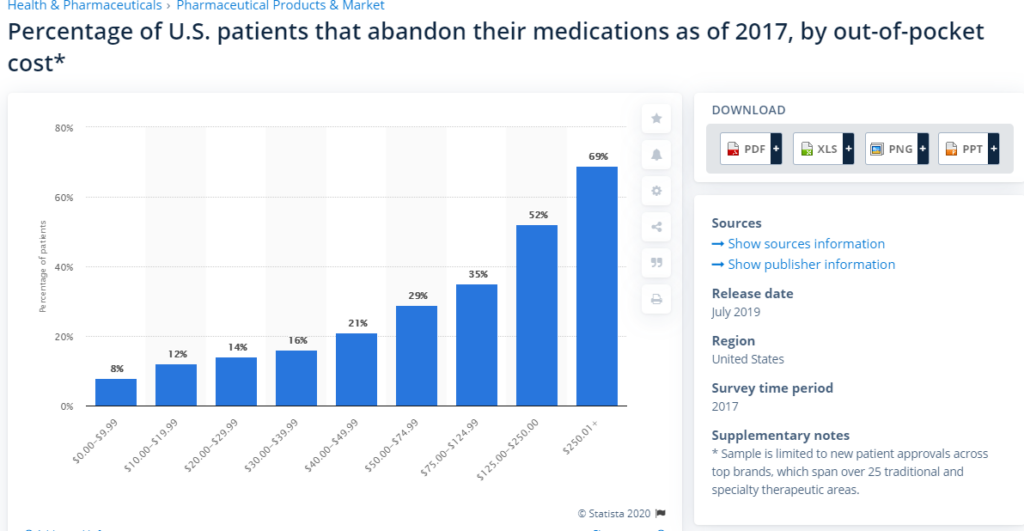
Part of the ongoing conversation in improving healthcare is the importance of patients’ adherence to prescriptions.
We all know the vital role medicines play in helping an individual as well as a community’s health.
Yet a new survey shows a high percentage of patients abandon their prescriptions. This is especially true for patients with major health problems or chronic conditions.

Screenshot is taken from Statistica.com
According to a 2017 data from Statistica, patients that pay $10 or lower were only 8% less likely to abandon their treatment, which is significantly lower than the 69% prescription abandonment that happens when a patient has to pay $250 dollars or more.
Clearly, the high cost of prescription medicine is one of the reasons for medication abandonment.
But what many patients do not realize is the huge impact of prescription non-adherence.
Non-adherence disrupts the care continuum and causes additional suffering to patients. It’s also a very expensive waste of money. A study published in 2018 by Lemstra and company showed that non-adherence to chronic disease medications costs the US $290 billion every year in avoidable health care costs.
New York Times reported that non-adherence is estimated to cause approximately 125,000 deaths and about 10% of hospitalizations.
In an effort to improve prescription adherence, various companies have come up with different solutions.
Some offer copay coupons while others are using apps for reminders.
AssistRX presents a unique solution. An integrated access solution focused on providing health care providers and patients the high-quality service they need.
AssistRX is an integrated access platform focused on providing health care providers and patients the options.
Richard Prest, Senior Executive Vice President of Corporate Strategy at AssistRX, explains that the way they look at the company is that it is solving the last hurdle faced by medications in gaining approval for the treatment of special therapies.
After all the tests and approval a drug has to go through, the final hoop is to get the patient to take the medication, and take it as they are supposed to.
What AssistRX does is getting the prescriptions done electronically as well as providing patient support services to help patients stay on therapy.
One of the ways AssistRX helps is by shortening the amount of therapy initiation.
“We were able to reduce the time to therapy versus faxing by 10 days, which was about a forty-five percent reduction time until patients got started. And obviously it’s better for the patient and better for the manufacturer if we can get them on the drug quicker.” Rich explained.
Prescription through fax takes longer because the data coming over from a fax machine sometimes goes directly to the pharmacy computer. When that happens, the data must be manually entered into the computer. This process takes time, and can introduce human errors.
The electronic prescription, on the other hand, is easier and more convenient. Once the physician enters the prescription into the company and then signs it, the image is sent directly to the pharmacy computer, a process that can be done in a short period of time and with less chance of human error.
Another solution that AssistRX offers is to reduce the first fill abandonment.
Of course, it’s different per product, but in this case, he mentioned two ways that AssistRX was able to reduce the first fill abandonment by a significant rate.
According to Rich, one of the things they also help solve are missing information on forms.
“We see missing information on about 30 percent of the forms that come in. And a lot of the time it’s a missing signature from the patient or the provider. And then when you reach back out to that patient or provider, you can’t actually reach them. So that’s another area where we’ve been having that exciting piece of technology work going on right now. It’s actually a smart fax form that will look to see if there are any issues and respond straight back to the doctor’s office to let them know that might be the wrong form or they just need to get a signature.”
This is a great way to use technology. Because people make mistakes most of the time, having a tech that can scrutinize every detail can reduce errors and move the process efficiently.
AssistRX is also working to make prior authorizations from manual to electronic. The company has tested it on a pharmacy benefit drug and has been able to improve the prior authorization from 13 to 32% while also reducing the headcount necessary to make phone calls.
Rich believes in using technology where you can to get as efficient as possible, but in instances where there’s a need for paper-based work, a backup team can get on the phone and provide the answers needed.
By leveraging both technology, and talent, AssistRX closes the gap and reduces the inefficiencies in the system.
Listen to our full interview here: https://outcomesrocket.health/assistrx/2020/09/
Primary nonadherence to chronic disease medications: a meta-analysis
Mark Lemstra, Chijioke Nwankwo, Yelena Bird, John Moraros
Patient Prefer Adherence. 2018; 12: 721–731. Published online 2018 May 7. doi: 10.2147/PPA.S161151
PMCID: PMC5944464
According to the 2020 Centers for Disease Control and Prevention report, roughly 34.2 million Americans have diabetes,...
Read MoreAs a farmer, Rod was used to long days. He worked 18 hours a day, 7 days...
Read MoreWith investors receiving hundreds of pitch decks every year, how do you create a compelling presentation that...
Read More
Brittany Busse Co-Founder, President, and Chief Medical Officer at
ViTelHealth


Stephen Thorne Founder and CEO at
Pacific Dental Services

Keith Carlson Nurse Career Coach